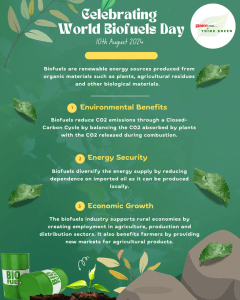World Biofuels Day
By Alyssa Jairam
World Biofuels Day is celebrated annually on 10th August and raises awareness of the importance of non-fossil fuels as an alternative to conventional fossil fuels. Biofuels are renewable sources of energy produced from organic materials such as plants, agricultural residues and other biological materials. The five main components of biofuels are feedstock (plant-based materials), carbohydrates, lipids (oils and fats), lignocellulose (found in woody and fibrous plants which are converted into cellulosic ethanol and other advanced biofuels) and biogas (methane and carbon dioxide).
The primary purpose of World Biofuels Day is to promote the use of biofuels and to highlight their potential in reducing greenhouse gas emissions, enhancing energy security and providing sustainable alternatives to fossil fuels. This day aims to educate persons on the benefits of biofuels, including their role in reducing dependence on imported oil and improving the economic stability of agricultural sectors.
According to the International Energy Agency (IEA), biofuels accounted for approximately 3% of the global transport energy demand in 2019. The global biofuels market size was valued at approximately USD 136 billion in 2020 and is expected to grow significantly in the coming years with a value of about USD 326 billion by 2032. Major producers of biofuels include: United States, Brazil and the European Union, with the U.S. and Brazil being the largest producers of ethanol, while the EU leads in biodiesel production.
World Biofuels Day therefore serves as a reminder of the importance of transiting to sustainable energy sources like biofuels which benefit the environment, economy, energy security and encourages a global movement towards a cleaner and more sustainable future.

Want to learn more about how Kenson Group is promoting a greener environment? Discover some of the key activities through our Carbon Net Zero Capability Portfolio here: https://bit.ly/3v5K9pk
